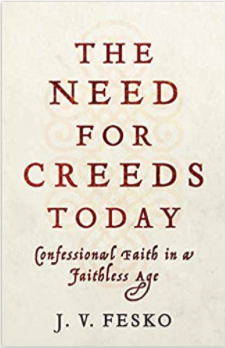The Need for Creeds Today: Confessional Faith in a Faithless Age
It wasn’t until the past eight years or so that I began to read and see the benefit of historic creeds and confessions. Growing up I never had a negative view of creeds and confessions, it was simply that the denomination I grew up in did not utilize them and I was never instructed on the usefulness and benefit of them.

I’m so thankful to now see how important it is to read the Bible alongside the church and understand what the church has historically believed the Bible means by what it says.
I recently read J.V. Fesko’s helpful book, The Need for Creeds Today: Confessional Faith in a Faithless Age and found it quite helpful as someone who has just been introduced to creeds and confessions in the past ten years.
Fesko does a wonderful job walking the reader through the topic of creeds and confessions. He begins with a chapter in which he demonstrates the Biblical arguments for confessions.
Those who have not previously been accustomed to the usefulness and benefits of confessions may wonder if it is even biblical to have them. Shouldn’t we just use the Bible?
Fesko walks through some passages to demonstrate the use of confessions and says that, “Far from being unbiblical, confessions of faith are employed by the Scriptures themselves and are necessary for the well-being of the church.”
In the second chapter, Fesko gives some historical background on confessions. I found this particularly helpful as he walks you through the development of and issues surrounding the confessions of the Reformation and post-Reformation confessions.
Fesko then follows this chapter by giving reason as to why there has developed a case against confessions. He walks through three major causes of deconfessionalization in the church.
In the fourth chapter, Fesko highlights the many benefits of confessions. He writes that, “Confessions have many benefits for the church, but chief among them are distinguishing between orthodoxy and heterodoxy, maintaining boundaries for a diversified orthodoxy, and codifying the historic witness of the church.”
In the final chapter, Fesko talks about confessions and piety by highlighting, “the duel that almost was.” Fesko utilizes a disagreement between theologians and the practice of dueling to highlight that, “Christians must not allow the world to shape the church’s ethos and conduct. The ‘duel that almost was’ also highlights our continual need for Christ and living out our union with him.”
If confessions are new to you or if you have been utilizing confessions for many years I would recommend Fesko’s book to you. It is both informative and encouraging and I trust that you would benefit from it as I did.
More in Monthly Newsletter
May 1, 2024
The Christian Ethic of Joy and SufferingMay 1, 2024
Elders ReportMay 1, 2024
Deacons Report